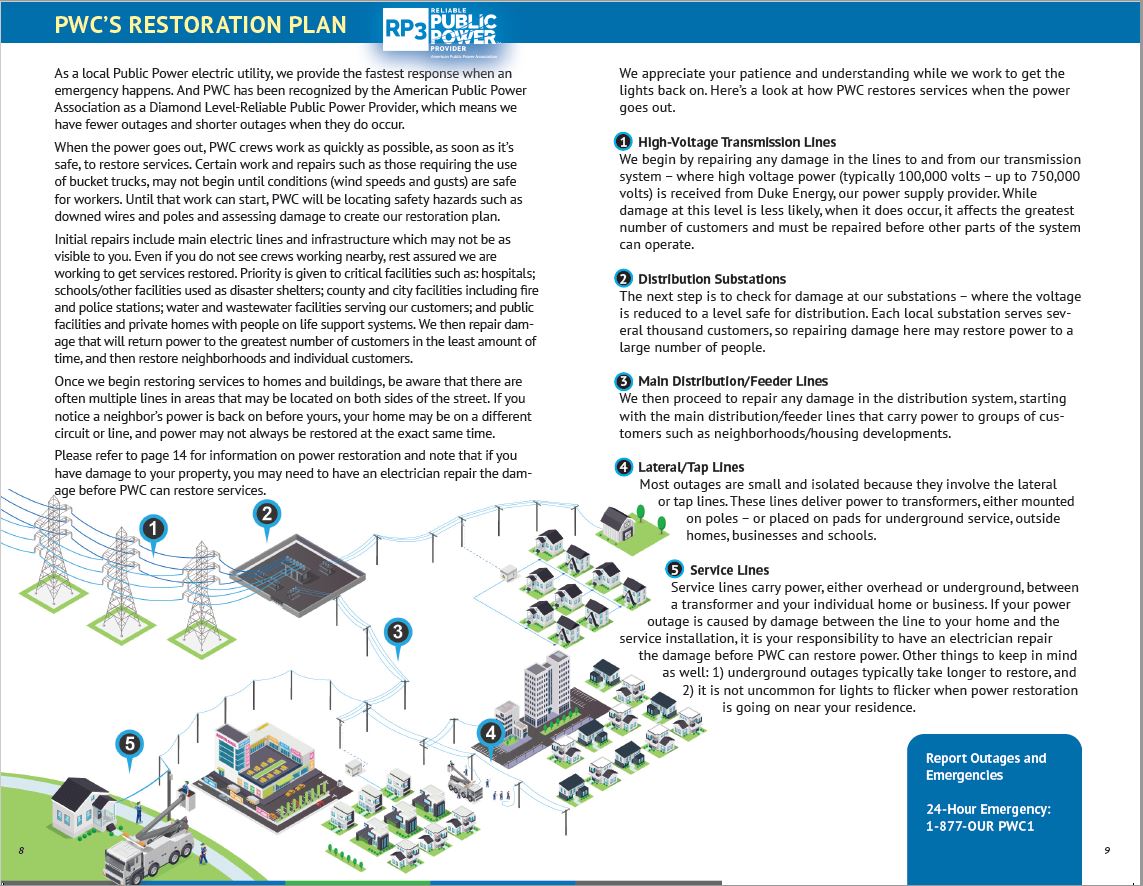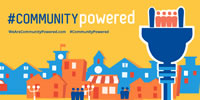Restoration
PWC operates a 24-hour emergency dispatch facility. Types of emergencies may be severe weather, power outages, downed tree limbs on electrical lines, water main breaks, etc.
If you need our emergency dispatcher, call 1-877-OUR-PWC1.
For the safety of our crews our buckets cannot be in the air when sustained wind speeds are 30+ mph. Our crews will continue to respond during that time, but cannot perform work that requires use of a bucket until the winds die down.
What’s Involved In Power Restoration
General Safety Tips
- Be aware if you live in a potential flood zone. If you are a new resident to Fayetteville/Cumberland County, familiarize yourself with flood prone areas and prepare your home and family, especially if you are located in an area that has experienced prior flooding events. Visit https://fiman.nc.gov/map.aspx for interactive flooding info for our area.
- Stay informed of weather and road conditions through local news; learn the meaning of watches and warnings.
- If advised to evacuate, do so immediately. Shut off the electricity and water before evacuating.
- Have valid identification if you evacuate. You may not be allowed back into your area unless you can show proof of residency.
- If you notice any signs of electrical system damage (sparks, broken or frayed wires, or the smell of hot insulation) call an electrician.
- If the power goes off, turn off major appliances to avoid a surge or fire when the power is restored.
- If you live in a mobile or manufactured home, have a pre-established safe shelter that you can get to quickly.
- Move to a safe area before roadways are cut off by floodwaters.
- Never try to cross flowing water by vehicle or foot. Six inches of water can cause you to lose control of your vehicle. Plus, there may be hidden debris that could cause injury or damage.
If Your Power Goes Out:
- Unplug any electrical appliances or electronics to prevent spikes once the power is restored. Ideally, sensitive electronics or devices should be on surge protectors to prevent damage.
- Turn the air conditioner off to prevent a surge once the power comes back on.
- Leave one light on so that you’re able to see when the power is restored.
- To keep thawing and spoiling food to a minimum, open the refrigerator or freezer as seldom as possible during a power outage.
- Food will stay frozen for up to 48 hours if your freezer is full and tightly packed and the door is kept closed.
- Before the storm, freeze containers of water that can be used as ice blocks to help reduce thawing.
- If food does defrost, use it within one or two days. Never refreeze food that has thawed completely.
- When the power comes back on, wait a few minutes before turning on the main switch. To give the electrical system a chance to stabilize, turn on essential appliances first, then gradually turn on other electronics.
- If your HVAC won’t turn on after a storm, you may need to restart it. Check the owner’s manual for restart instructions for your unit. If you have any
doubts, or if the circuit breaker shuts off again after resetting it, call a professional. - When power is restored, check and reset GFCIs (Groundfault circuit interrupter outlets) throughout your home, especially freezers in garages.
If you don’t have power when it’s restored to others in your area:
- Check your breaker box panel and make sure all the switches that should be on, are on, including the main breaker.
- If you have a tripped breaker, move it to the off position and then push it hard to the on position. If it does not click on, you may have a breaker issue.
- If you have a blown fuse, it will be visible and needs to be replaced.
Storm Preparation
Resources
- Electric Outage Map
- PWC’s Restoration Plan
- Storm Restoration Infographic
- Storm Preparation Guide
- Storm Preparation Guide Request Form
- Safety Tips
- Downed Power Line Safety Tips
- Business Continuity
- City of Fayetteville Storm Prep Info
- Storm FAQ
- Ready.gov
- National Weather Service’s Hurricane Center
- Mutual Aid Agreements
- Consumer’s Guide to Food Safety



